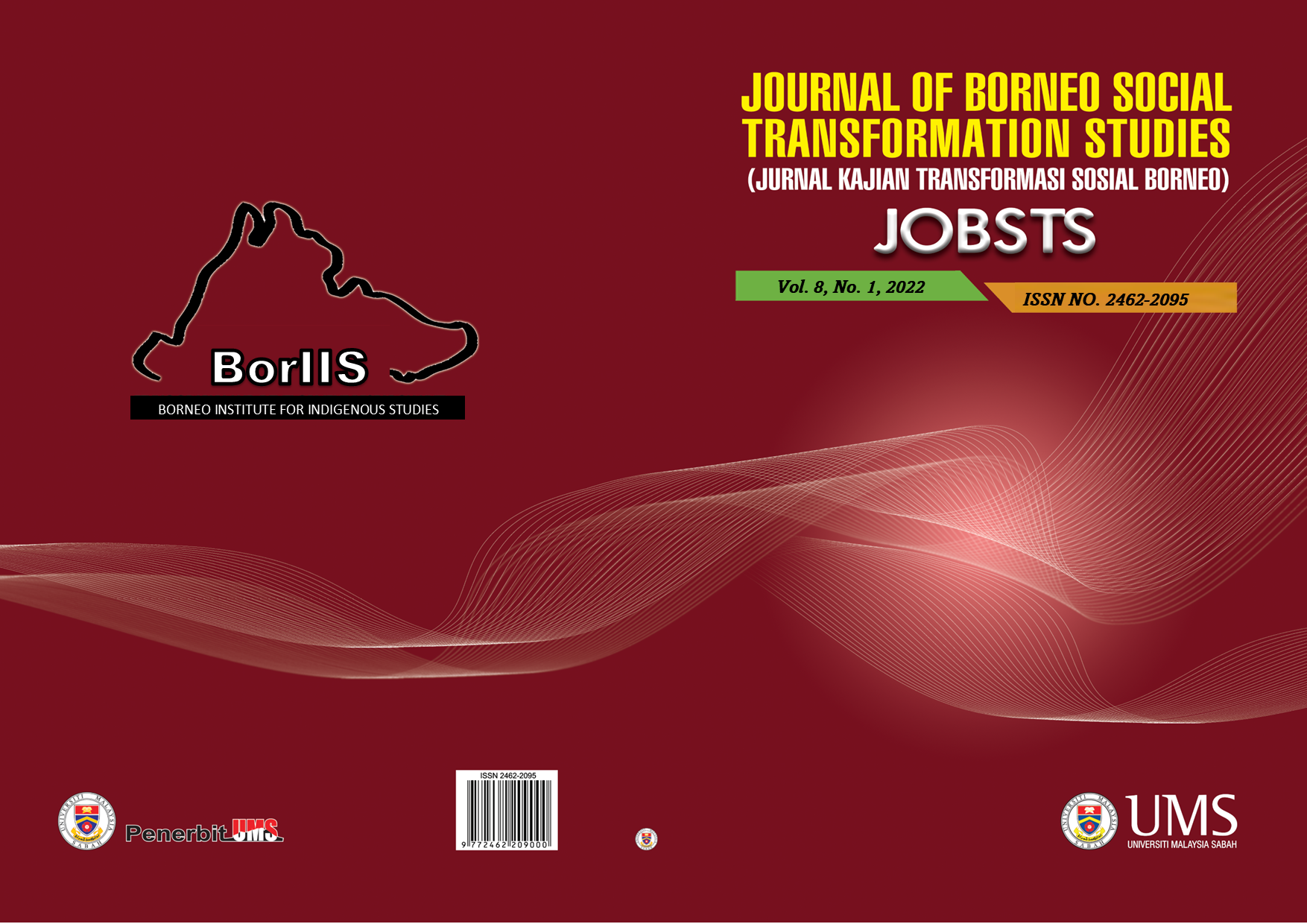ISU KEMISKINAN DIGITAL YANG DI HADAPI OLEH PENIAGA LUAR BANDAR DI KAWASAN SIPITANG, SABAH, MALAYSIA
THE ISSUE OF DIGITAL POVERTY FACED BY RURAL ENTREPRENEURS IN THE SIPITANG AREA, SABAH, MALAYSIA
DOI:
https://doi.org/10.51200/jobsts.v8i1.4150Keywords:
Kemiskinan Digital, Covid-19, Peniaga Luar Bandar, Pasar Tamu, Perniagaan atas talian.Abstract
ABSTRACT
The changing economic landscape, which began to adapt to online businesses after the closing of the pasar tamu during the Movement Control Implementation (MCO) period, has raised the issue of digital poverty, particularly among rural entrepreneurs. Although online businesses became a viable source of income during the MCO era, the decline in rural Internet usage between 2014 and 2020 demonstrates that these individuals cannot adapt to the changing economic environment. Moreover, it indirectly affected rural entrepreneurs, as the closing of the pasar Tamu halted their income generation and exposed them to the issue of digital poverty. Some informants' interviews revealed that rural entrepreneurs struggle to use technology as a business platform due to the effects of poverty; even if they have access to the Internet, their use is passive. Two factors prevent rural entrepreneurs from engaging in online business: a lack of technological knowledge and proficiency. This is because technology-related courses are rarely offered in the Sipitang region. The next factor is the generation gap and the difficulty of accepting change, these people argue that technological skills should only be learned by young people and more comfortable doing business in the pasar tamu making it difficult for them to adapt to technology and trade online.
ABSTRAK
Perubahan landskap ekonomi yang mulai beradaptasi dengan perniagaan atas talian berikutan penutupan pasar tamu dalam tempoh Perlaksanaan Kawalan Pergerakan (PKP) telah menimbul isu kemiskinan digital terutamanya kepada golongan peniaga di luar bandar. Walaupun perniagaan atas talian menjadi alternatif untuk menjana pendapatan semasa tempoh PKP, namun penurunan penggunaan Internet luar bandar dari tahun 2014 sehingga 2020 menggambarkan golongan ini tidak mampu beradaptasi dengan perubahan landskap ekonomi. Ia secara tidak langsung memberi impak kepada peniaga luar bandar berikutan penutupan pasar tamu sehingga menyebabkan penjanaan pendapatan mereka terhenti dan turut berhadapan dengan masalah kemiskinan digital. Hasil temu bual beberapa orang informan mendapati peniaga luar bandar berhadapan dengan ciri-ciri kemiskinan yang mana mereka mengalami kesukaran untuk menggunakan teknologi sebagai platform berniaga walaupun mereka mempunyai akses Internet akan tetapi penggunaannya masih secara pasif. Terdapat dua faktor yang menjadi penghalang kepada peniaga luar bandar untuk menyertai perniagaan atas talian iaitu faktor kekurangan pengetahuan dan kemahiran dalam menggunakan teknologi. Ini berikutan kursus berkaitan teknologi jarang diadakan kawasan Sipitang. Faktor seterusnya ialah jurang generasi dan sukar menerima perubahan, golongan ini berpendapat bahawa kemahiran teknologi hanya perlu dipelajari oleh golongan muda dan lebih selesa berniaga di pasar tamu menyebabkan mereka sukar beradaptasi dengan teknologi dan berniaga atas talian.
References
Artikel Jurnal
Arendt, L. (2008). Barriers to ICT adoption in SMEs: how to bridge the digital divide? Journal of Systems and Information Technology, 10(2), 93–108.
Atnafu, D., & Balda, A. (2018). The impact of inventory management practice on firms’ competitiveness and organizational performance: Empirical evidence from micro and small enterprises in Ethiopia. Cogent Business & Management, 5(1), 1503219.
Chairoel, L., Widyarto, S., & Pujani, V. (2015). ICT adoption in affecting organizational performance among Indonesian SMEs. The International Technology Management Review, 5(2), 82.
Huang, S. C., & Cox, J. L. (2014). Establishing a social entrepreneurial system to bridge the digital divide for the poor: a case study for Taiwan. Universal Access in the Information Society, 15(2), 219–236.
Jaganathan, M., Ahmad, S., Mohd Nafi, S. N., & Uthamaputhran, L. (2018). Determinants for ICT Adoption and Problems: Evidence from Rural Based Small and Medium Enterprises in Malaysia. International Journal of Entrepreneurship, 22(4), 1–13
Katz, Y. (2019). Technology, Society and the Digital Gap. Advances in Applied Sociology, 09(01), 60–69.
Lekhanya, L. M. (2018). The Digitalisation of Rural Entrepreneurship. Entrepreneurship - Trends and Challenges. Published.
Rozmi, A. N. A., N.E., P., Razak, A., Izhar, M., & Imran, A. (2020). Factors Affecting SME Owners in Adopting ICT in Business using Thematic Analysis. International Journal of Advanced Computer Science and Applications, 11(7).
Susanto, A. (2016). Analisis Kondisi Digital Poverty di Indonesia. Jurnal Penelitian Pos Dan Informatika, 6(2), 169.
Vanessa Ratten (2020) Coronavirus (covid-19) and entrepreneurship: changing life and work
landscape, Journal of Small Business & Entrepreneurship, 32:5, 503-516,
Yusof, M. N., & Md Zain, Z. (2017). Pembangunan Luar Bandar melalui Penerapan Teknologi Maklumat dan Komunikasi: Kajian di Daerah Kubang Pasu, Kedah. Journal of Advanced Research in Social and Behavioural Sciences, 3, 36–49
Buku
Barrantes, R. (2007). Analysis of ICT Demand: What Is Digital Poverty and How to Measure
It? DIGITAL POVERTY: Latin American and Caribbean Perspectives Edited, 29–53
Social Research Methods by Alan Bryman (19-Jan-2012) Paperback. (2021). OUP Oxford; 4 edition (19 Jan. 2012).
Sumber Internet
Astro Awani. (2020, March 31). COVID-19: Malaysia sedang alami perubahan ekonomitotal, ini 8 langkah persediaan. astroawani.com. https://www.astroawani.com/berita-malaysia/covid19-malaysia-sedang-alami-perubahan-ekonomi-total-ini-8-langkah-persediaan-236161
Ibrahim, H. (2020, March 25). Perintah Kawalan Pergerakan sehingga 14 April [METROTV]. Harian Metro. https://www.hmetro.com.my/utama/2020/03/558304/perintah-kawalan-pergerakan-sehingga-14-april-metrotv
Prosiding Artikel
Susanto, A. (2018). The Digital Poverty and Empowerment Issue in Indonesia. 2018 International Conference on ICT for Rural Development (IC-ICTRuDev).






